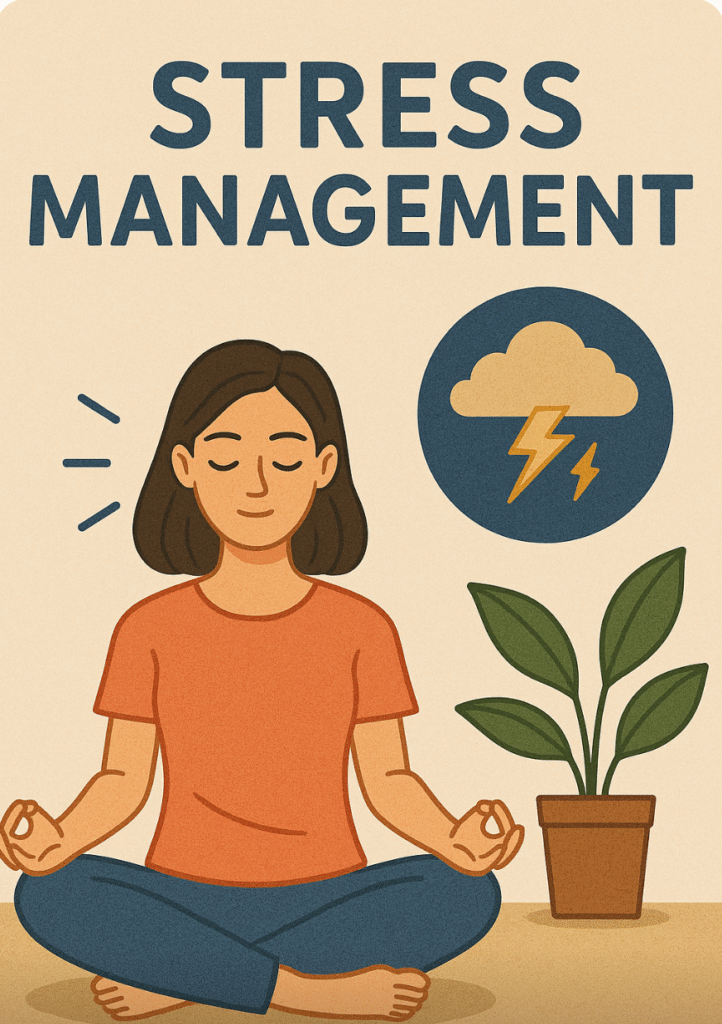Why Stress Management Matters Today
In our modern era, stress has become an unavoidable part of life. From work deadlines and financial pressures to digital overload and global uncertainties, chronic stress is a silent epidemic affecting millions worldwide. According to the American Psychological Association (APA), nearly 77% of people regularly experience physical symptoms caused by stress. Left unmanaged, chronic stress can lead to anxiety, depression, heart disease, and weakened immunity. Stress management is no longer optional—it’s essential for maintaining overall health and well-being.
The Science Behind Stress
When we experience stress, the body triggers a “fight or flight” response, releasing cortisol and adrenaline. While this response is helpful in emergencies, constant activation due to daily stressors can exhaust the body and mind. Prolonged exposure to stress hormones disrupts sleep, digestion, and cognitive performance, leading to burnout and long-term health risks.
Effective Stress Management Techniques
- Mindfulness and Meditation
- Mindfulness meditation trains the brain to focus on the present moment, reducing rumination and anxiety.
- Studies in JAMA Internal Medicine found that mindfulness practices significantly lowered stress levels and improved emotional regulation.
- Physical Activity
- Exercise releases endorphins, the body’s natural mood lifters. Activities like yoga, walking, and cycling reduce cortisol while boosting resilience.
- The Mayo Clinic highlights that even 30 minutes of moderate exercise daily can improve stress tolerance.
- Breathing Techniques
- Deep breathing activates the parasympathetic nervous system, calming the body’s stress response.
- Practices such as the 4-7-8 method are widely recommended for immediate relaxation.
- Healthy Lifestyle Habits
- Balanced nutrition, proper hydration, and quality sleep create a foundation for stress resistance.
- Limiting caffeine and alcohol helps stabilize mood and energy levels.
- Time Management
- Setting priorities, delegating tasks, and avoiding overcommitment reduces mental pressure.
- Tools like digital calendars and productivity apps can create structure and balance.
- Social Support
- Talking with friends, family, or support groups provides emotional release and perspective.
- According to the Harvard Health Review, strong social ties are among the most effective buffers against chronic stress.
The Long-Term Benefits of Stress Management
- Improved Mental Health: Reduced risk of anxiety and depression.
- Better Physical Health: Lower blood pressure, stronger immunity, and reduced heart disease risk.
- Enhanced Productivity: Better focus, creativity, and decision-making skills.
- Longevity and Quality of Life: Chronic stress reduction contributes to healthier aging.
Digital Age Challenges
The rise of technology has created new stress triggers—social media pressure, constant notifications, and digital fatigue. To counteract this, many experts recommend digital detox practices, such as turning off devices an hour before bed, limiting screen time, and practicing “tech-free” weekends.
Conclusion
Stress may be unavoidable, but how we respond to it determines its impact. Through mindfulness, physical activity, supportive relationships, and healthier daily habits, stress can be transformed from a destructive force into a manageable part of life. Building resilience today ensures better health, productivity, and happiness tomorrow.
🇰🇷 Premium Korean Ginseng Online Shop







